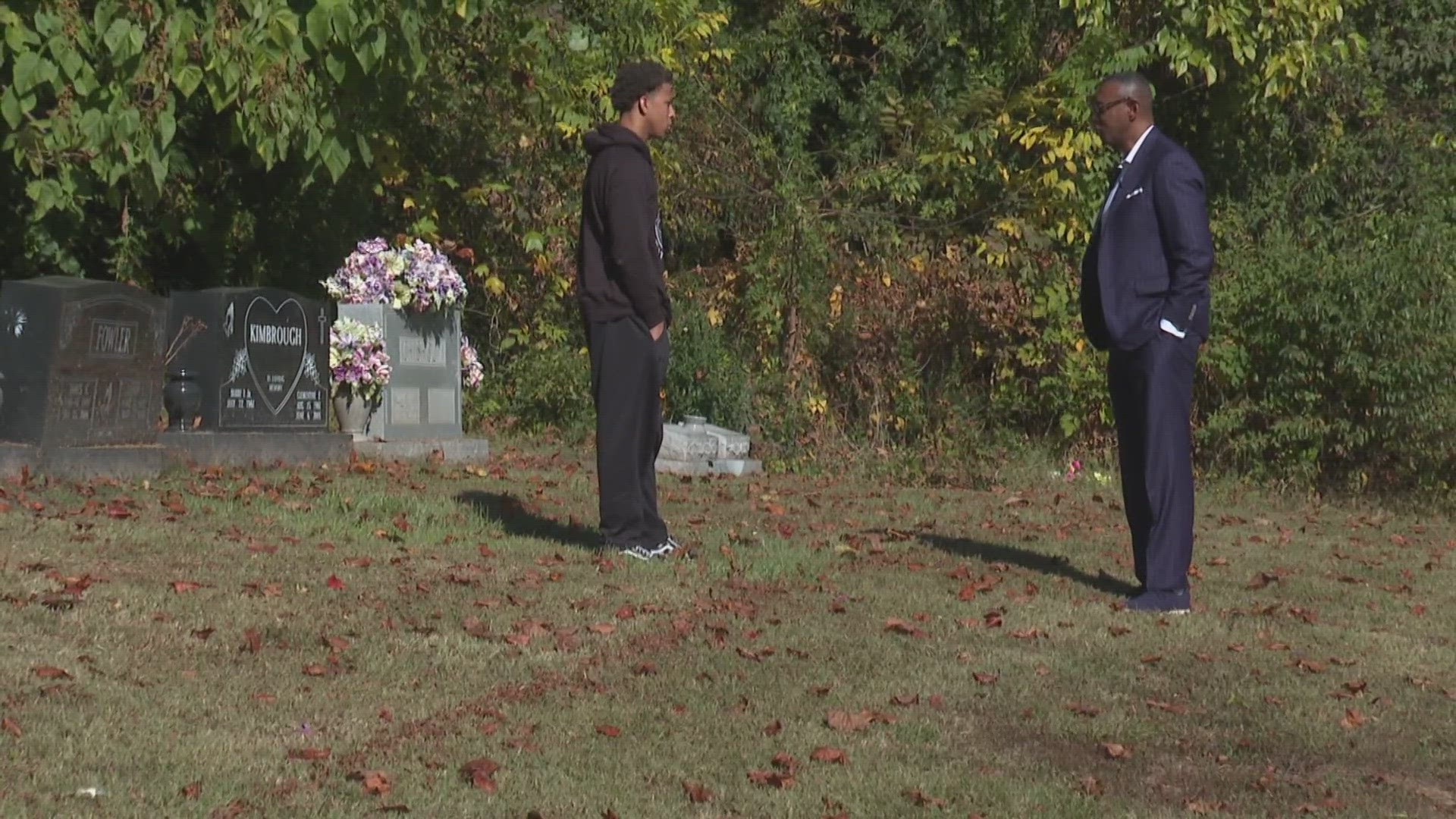CLEMMONS, N.C. — Chronic pain...is an opioid epidemic side effect.
"I never forget. I went into the cemetery. (It was) pitch-black dark, standing at her grave, and I told her I was coming home. I was coming home to join her. That was the most difficult time of my life," quivered the voice of a grieving husband.
Even those who respond to calls for help...sometimes have to make them.
"How did this happen in my household? The same war that I'm fighting is going (on) in my household. How did I miss that?" he asked.
Behind Forsyth County Sheriff Bobby Kimbrough Jr.'s badge is a battle scar across his heart.
One True Love
"So, me and Clem grew up on the same street — E. 25th St. And, I told her one day, when I was 13 years old, I said, 'I will marry you one day.' We dated for years, and we got married," he recalled.
Bobby and Clementine Fowler Kimbrough — called "Clem" — turned 15 years of wedded bliss into a growing family of sons. Jalen Kimbrough was her baby.
"She seemed very outgoing, and she would take the clothes off her back for someone," Jalen Kimbrough smiled.
Personality inspired her profession — a registered nurse at a large hospital.
"She loved what she did for a living. She was proud to be a nurse. She was proud to wear that white uniform," Bobby Kimbrough said.


Red Flags
Over time, the 12-hour overnight shifts took a toll. Plus, her husband was gone months at a time, as a Drug Enforcement Administration (DEA) agent fighting drug trafficking abroad. They counted on daily phone calls.
"Looking back, there were several times when you could be talking to her in mid-sentence, and she would just fall off to sleep. At the time, I thought she was tired. She's overworked. I realized some things later on," he recalled.
June 6, 2005, he was back in town, running an errand, when his cell rang. It was his older son on the line.
"Jamesen called me and said that Mom is sleeping in the laundry room, and I said, 'Asleep in the laundry room?' He said, 'Yeah.' So, I said, 'I'm on the way.' He said, 'She won't move. I'm trying to wake her.' I said, 'Hang up.' We dialed 911," Bobby Kimbrough recalled.
He said he got home and ran through the garage and into the laundry room.
"I looked at her and got down on my knees to touch her, and she was cold. I started doing CPR, even though she was cold, and I knew," he said.
His answer to what happened came weeks later in the mail with the death certificate.
"It confirmed my worst fear, and I say that because even in death, we want death to be a respectable death. You know? No one wants to say, 'My loved one died of an overdose.' I told my kids she died of an aneurysm," he admitted.
The Tough Truth
"My dad used to tell everyone that she passed from an aneurysm," Jalen Kimbrough said.
He was just 18 months old when his mom died and only recently learned the truth of how--acute methadone toxicity.
Methadone, according to the Substance Abuse and Mental Health Services Administration (SAMHSA), is a long-acting opioid used to treat opioid use disorder. A common side effect is drowsiness, so Bobby Kimbrough suspects his wife secretly used it as a sleep aid.
He acknowledged it then became addicting. After her death, more telltale signs surfaced, as he was looking for information for the insurance company.
"I started going through her pocketbooks, and that's when I realized something wasn't right. I started seeing the little vials they come in, in the hospital, and I realized what happened," he said.
What happened next was a dark, personal spiral.
Survivor's Grief
"How, how, how? Why, why, why? That why has caused me a lot of headaches, a lot of heartaches, a lot of guilt I carry as to why," Bobby Kimbrough said.
Months later came a reckoning — a reminder of his why to push forward.
"There was a ring at the doorbell. I went downstairs. It was my dad. He asked if I was all right, and I told him, 'No.' We talked for a minute, and he said, 'You got to get yourself together because these boys need you,'" he recalled.
Ache to Action
He channeled that need into his work, eventually as Forsyth County Sheriff, slowly peeling back layers of stigma.
His mantra, "never walk alone" is now the name and mission of his community outreach, as he speaks to community members who also have lost loved ones to what is now an epidemic in North Carolina.
In the summer of 2022, awareness inspired prevention, as the Forsyth County Sheriff's Office and Forsyth County Health Department distributed the overdose antidote naloxone, installing a vending machine in the jail — free for anyone, no questions asked.
"My favorite project I worked on with Sheriff Kimbrough's office was getting the naloxone vending machine in the Forsyth County Jail, because we have actual proof that saves lives," former Forsyth Co. Public Health and Behavioral Health divisions employee Amanda Clark said.
Now, in a new role as the first "drug and injury prevention manager" for Guilford County, Clark spreads the word about opioid prevalence and precaution across all socioeconomic backgrounds.
"It takes just one person to save a life. Every one of those overdose deaths is preventable," she said.
Strength in the Struggle
In an opinion piece for Forsyth Women Magazine in 2018, he wrote of "finding strength in the struggle" his family has endured since 2005. He admitted, "Had we accessed the resources available, I would likely be writing a different story today."
The story he is writing now, for his beloved late wife, is one of perseverance.
"I'm carrying out the legacy of her boys. The story I'm writing now is I'm being a better person. I'm telling her story, and I'm being transparent," he said.
Jalen Kimbrough, now a college student, is scripting his own chapter, vowing to help other children who have lost parents to opioids.
"It's not abandonment. It was just God had a plan for you, and for you to keep pushing and for you to tell your story," he said.
Peace and Purpose
For Bobby and Jalen Kimbrough, visiting the cemetery brings a sense of calmness and clarity on tough days.
"She still affects me every day. I still go by the cemetery. I still go by there. Years later," Bobby Kimbrough said.
He and his son took WFMY News 2's Meghann Mollerus to Clementine Kimbrough's gravesite and recounted a pivotal moment from a visit there years ago.
"You remember the first time I brought you here? Remember the story? Yeah. What happened?" Bobby Kimbrough asked his son.
He remembered, indeed.
"You said we started at the bottom of the hill, and you said when we got up here, I immediately ran to her, her headstone," Jalen Kimbrough said.
His father, looking at the grave with his name etched beside his wife's, reflected, "All of us know our birth date, and none of us knows our exit date. It ain't really important, right? It's what you do in between those dates. Remember that."
Righting a Wrong
North Carolina is receiving $1.5 billion from pharmaceutical companies in a nationwide opioid settlement. Already, the state has used some of the money for more naloxone, now available for free at Guilford County jails (Greensboro and High Point), as well as the Guilford and Forsyth County Health Departments.
Over the last several years, NC lawmakers have taken action to combat opioid distribution. Jan. 1, 2018, the "STOP Act" provision took effect, setting new opioid prescribing limits -- up to a five-day regimen for acute pain, with refills available as authorized by a doctor.
In May 2021, an updated three-point proposal called "NC's Opioid and Substance Use Action Plan" took effect, expanding a focus on polysubstance use and equity in resources to address the overdose epidemic.
Most recently, in September 2023, Gov. Roy Cooper signed into law Senate Bill 189, the "Fentanyl and Drug Offenses and Related Charges." It will become law on Dec. 1, 2023, and increased fines imposed on people convicted of trafficking heroin, fentanyl, or carfentanil (a synthetic opioid). The law also puts harsher penalties on people convicted of causing death by distribution.

